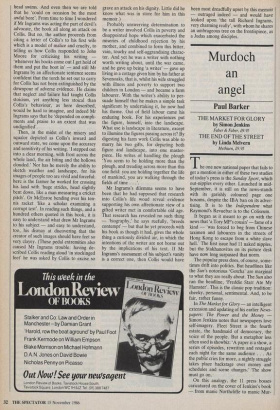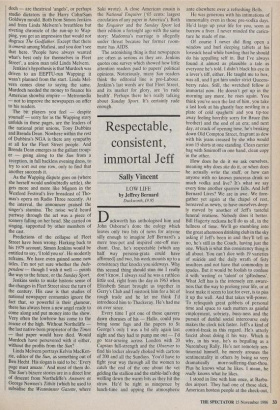Murdoch an angel
Paul Barker
THE MARKET FOR GLORY by Simon Jenkins
Faber & Faber, f9.95
THE END OF THE STREET by Linda Melvern
Methuen, f9.95
The one new national paper that fails to get a mention in either of these two studies of today's press is the Sunday Sport, which out-nipples every other. Launched in mid- September, it is still on the news-stands with its garishly coloured page one bosoms, despite the IBA ban on its adver- tising. It is to the Independent what Raymond's Revuebar is to the Coliseum.
It began as it meant to go on with the news that 'a Tory MP's cousin' — fame of a kind — 'was forced to beg from Chinese taximen and labourers in the streets of Hong Kong to escape from a white slave hell.' The first issue had 11 naked nipples, but the Stakhanovites on its picture desk have now long surpassed that norm.
The popular press does, of course, some- times drift into politics. But headlines like the Sun's notorious `Gotcha' are marginal to what they are really about. The Sun also ran the headline, 'Freddie Starr Ate My Hamster'. This is the classic pop tradition: cheeky, personal, sentimental. And, to be fair, rather funny.
In The Market for Glory — an intelligent extension and updating of his earlier News- papers: The Power and the Money Simon Jenkins notes that newspapers love self-imagery. Fleet Street is the fourth estate, the handmaid of democracy, the voice of the people. But a metaphor less often used is showbiz: 'A paper is a show, a series of episodes, rewritten and restaged each night for the same audience . . . As the public cries for more, a nightly struggle takes place backstage over money and schedules and scene changes.' The show must go on.
On this analogy, the 11 press bosses caricatured on the cover of Jenkins's book — from manic Northcliffe to manic Mur- doch — are theatrical 'angels', or perhaps studio dictators in the Harry Cohn/Sam Goldwyn mould. Both from Simon Jenkins and from Linda Melvem's breathless but riveting chronicle of the run-up to Wap- ping, you get an impression that would not disgrace The Godfather. Except that there is omerta among Mafiosi, and you don't see that here. 'People have always wanted what's best only for themselves in Fleet Street', a union man told Linda Melvern.
Jenkins's hypothesis is that Murdoch was driven to an EEPTU-run Wapping: it wasn't planned from the start. Linda Mel- vern comes close to saying the same. Murdoch needed the money to finance his American showbiz empire — Metromedia — not to improve the newspapers on offer to his readers.
The bit players you feel — despite yourself — sorry for as the Wapping story unfolds in these pages, are the leaders of the national print unions, Tony Dubbins and Brenda Dean. Nowhere within the rest of Dubbins's NGA is there any sympathy at all for the Fleet Street people. And Brenda Dean emerges as the gallant troup- er — going along to the Sun from a reception, in full backless evening dress, to try to sort out one row, only to find that another succeeds it As the Wapping dispute goes on (where she herself would undoubtedly settle), she gets more and more like Mignon in the Wexford Festival's live broadcast of Tho- mas's opera on Radio Three recently. At the interval, the announcer praised the singer's stamina. The noise we'd heard partway through the act was a piece of scenery falling on her head. She carried on singing, supported by other members of the cast.
Predictions of the collapse of Fleet Street have been wrong. Harking back to his 1979 account, Simon Jenkins would be entitled to say, 'I told you so'. He modestly refrains. We have even gained some new titles. I'm not yet sure whether the Inde- pendent — though I wish it well — points the way to the future, or the Sunday Sport.
Jenkins seeks to make historic sense of the changes in Fleet Street since the turn of the century. His case is that studies of national newspaper economics ignore the fact that, so powerful is their glamour, there has always been a new angel ready to come along and put money into the show. Very often the lowbrow has come to the rescue of the high. Without Northcliffe the last native-born proprietor of the Times — that paper would have died. Would Murdoch have persevered with it either, without the profits from the Sun?
Linda Melvern portrays Kelvin MacKen- zie, editor of the Sun, as something out of Ben Hecht. His slogan is said to be: 'Every page must amaze.' And most of them do. The Sun's bizarre stories are in a direct line of descent from Northcliffe's Answers or George Newnes's Titbits (which he used to subsidise the Westminster Gazette, where Saki wrote). A close American cousin is the National Enquirer (`65 cents: largest circulation of any paper in America'). Both the Enquirer and the Sunday Sport led their edition a fortnight ago with the same story: Madonna's marriage is allegedly under threat because her former room- mate has AIDS.
The astonishing thing is that newspapers are often as serious as they are. Jenkins quotes one survey which showed how little attention readers paid to papers' political opinions. Notoriously, many Sun readers think the editorial line is pro-Labour. Jenkins's last words are that Fleet Street, and its market for glory, are 'in rude health'. Perhaps there he's really talking about Sunday Sport. It's certainly rude enough.



































































 Previous page
Previous page